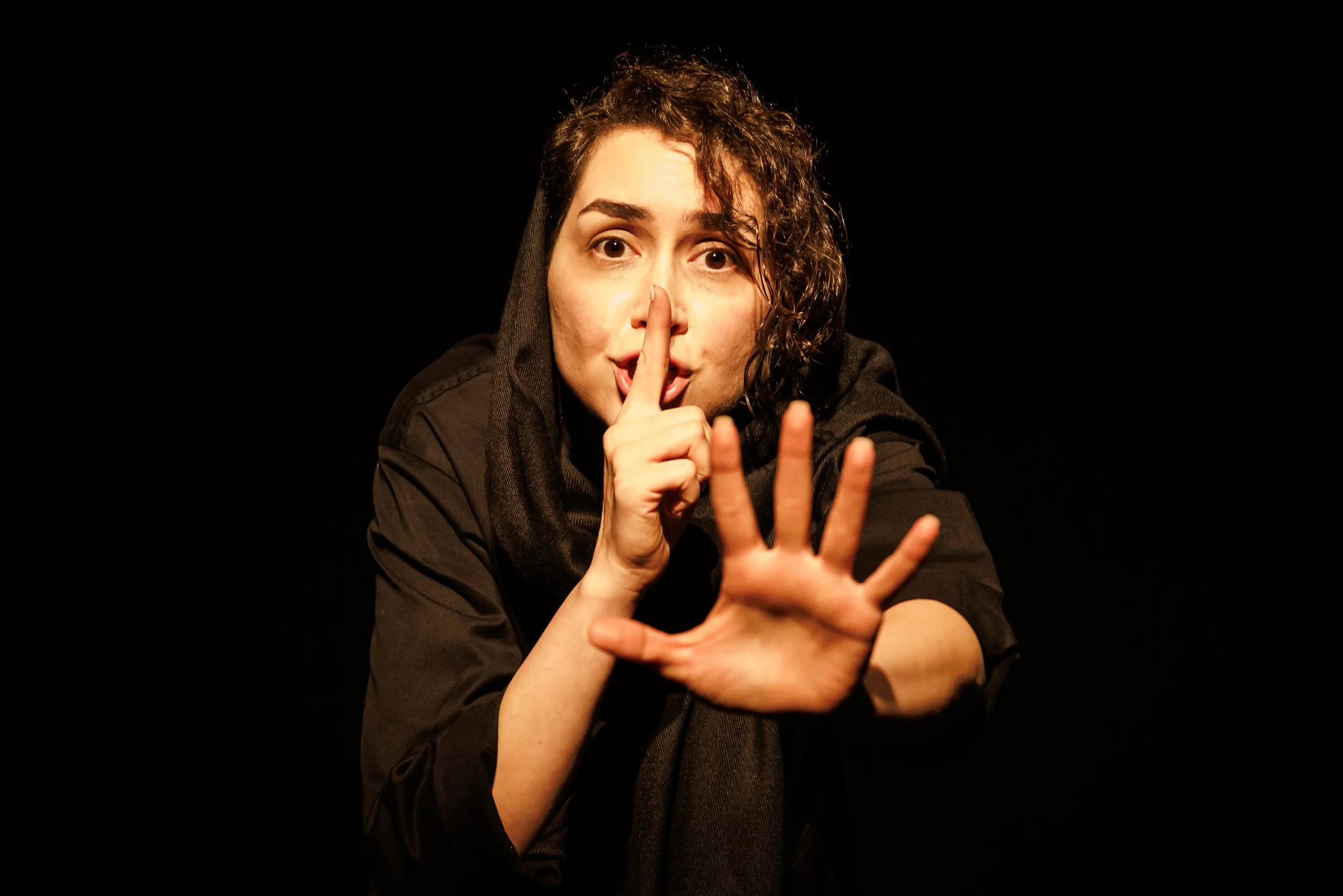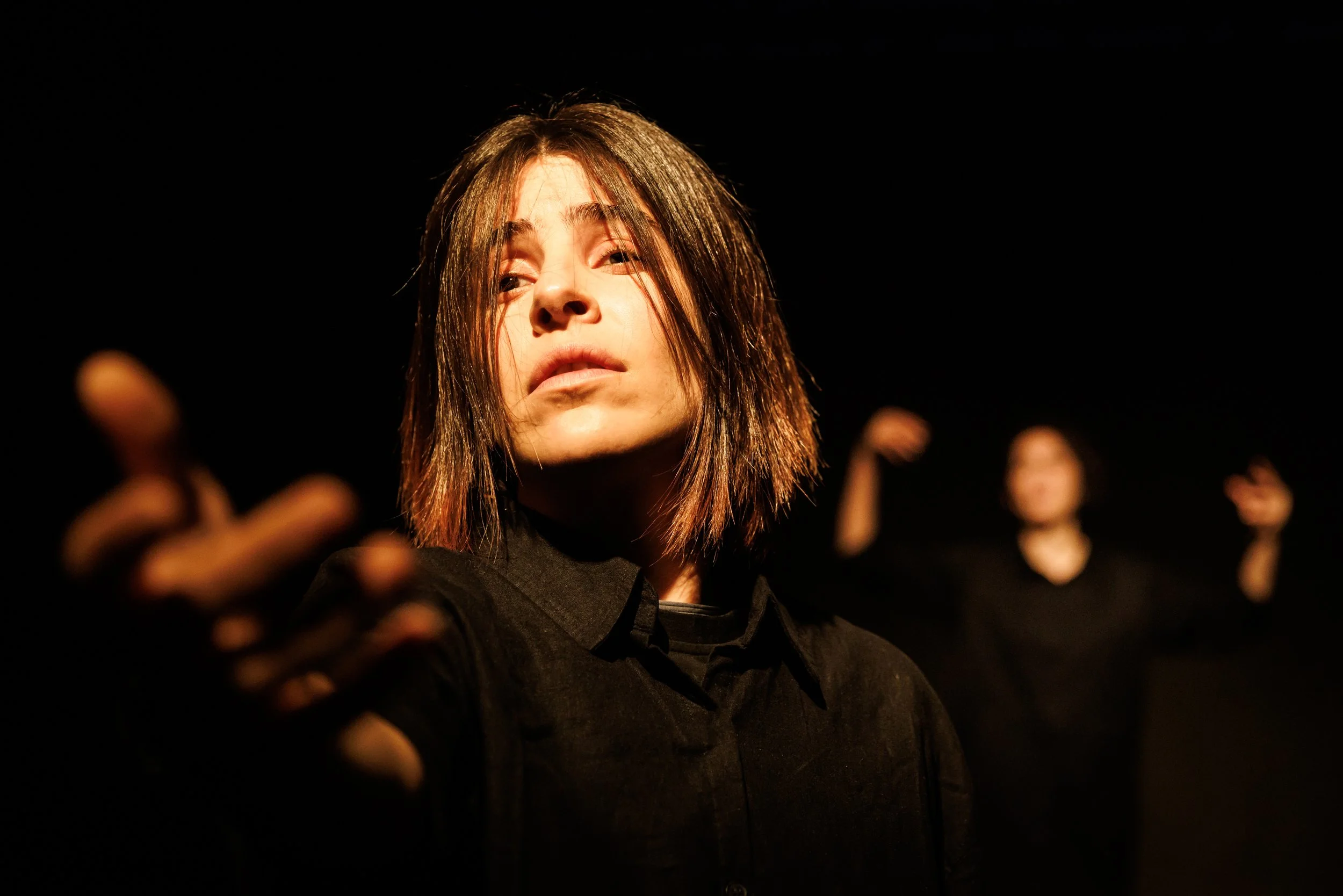REVIEW: Echoes of Liberation, the power of 'I’m a Virtual Being'
I’m a virtual being, take photos of me is a written by Mohammad Rezaee Rad, and presented as part of La Mama’s Festival of Mother Tongues from 12 - 13 November.
Language: Farsi
Directed by Ehsan Bayatfar
Performed by Sadaf Monajemi, Sara Hakimi, Sepideh Jafari, Elahe Faraazmand
Video and poster design by Iman Bayatfar
Sound design by Misagh Zamani
Review by Jodi Kashani
Sada Monajemi stars in I’m a virtual being, take photos of me as presented by La Mama’s Festival of Mother Tongues. November 2024. Image: Darren Gill
I’m a virtual being, take photos of me is an exceptionally important narrator of the lived experiences of Iranian women who have been oppressed throughout the history of the Islamic regime of Iran. However, this brave generation of women has transformed this oppression into a stance against cruelty, creating one of the most progressive movements under the name Women, Life, Freedom. This movement has gained global traction, largely due to the contribution of the media in sharing it across the world.
This play, written by one of the brightest contemporary Iranian playwrights, Mohammad Rezaei Rad, elaborately captures this milestone in the history of Iran.
I’m a virtual being, take photos of me is hosted by La Mama’s Festival of Mother Tongue and directed by Ehsan Bayatfar. Mohammad Rezaei Rad has transformed Iranian contemporary theatre, ushering it into a new era. His works, such as Verb and The Angel of History, are among the most powerful plays, exploring the intersection of philosophy, sociology, and history. I’m a Virtual Being benefits from his extraordinary narrative power.
Contextually, the play narrates the life of a woman, depicted over the course of ten steps before being tragically ended by a military officer. This event unfolded against the backdrop of the Women, Life, Freedom movement, where people took to the streets in peaceful protest against the Iranian regime's systemic subjugation and marginalisation of women. Specifically, the play spotlights how the ideology of the Iranian regime benefits from patriarchal structures as a core inspiration for its policies, aimed at controlling women's bodies by enforcing compulsory hijab in public spaces.
Although the play's central focus targets the political realities of the Iranian regime, it is presented as a deeply emotional monologue that beautifully captures the despair, sorrow, and injustice faced by every Iranian woman from the moment of birth.
The play begins with a conversation between the actor and the audience, referencing the play's title. The unnamed woman recounts how, in the moment she lay soaked in her own blood, her image captured by a stranger who is also now deceased was shared across the internet. This act has transported her into a liminal space, caught between the world of the living and the world of the dead. In this virtual state, she feels that every person who has seen her face online knows her, making her presence everywhere and nowhere. However, what remains unseen is her life before being shot by military officers.
Ehsan Bayatfar’s direction for stage design and lighting has been carefully chosen with simplicity, all under the shadow of the dark street that witnessed the girl’s death. Her lived experience is the shared experience of all of us, especially women who have lived the concept of freedom in a highly conditional way. The actors embody this cross-generational pain, with lead actor Sadaf Monajemi authentically narrating the story of this woman. Although she speaks Farsi throughout the play, her gestures and movements vividly conceptualise pain and grief on a universal level, effectively communicating with everyone regardless of language or nationality.
“Her lived experience is the shared experience of all of us, especially women who have lived the concept of freedom in a highly conditional way.” Image by Darren Gill.
The power of the playwriting, directing, and acting complement one another, depicting the life of a person in the ten steps they took toward seeking freedom, with each step referencing a phase of their life that resonates deeply and shares common ground with every human being.
For women raised in the geography of Iran, their lived experiences are intertwined with a combination of hope and despair as they strive to eventually taste freedom. This pursuit gives them the strength to take steps toward liberation, even at the cost of their lives. Now, she is everywhere, as that pivotal moment was recorded and shared across the world.
I’m a Virtual Being, Take Photos of Me embodies the voice of many who have been killed or imprisoned for taking steps toward freedom, particularly for the future generations of women. The experience of witnessing a story so deeply resonant with mine on an Australian stage was unexpectedly profound and moving. It’s rare to see such an authentic and courageous portrayal of the struggles and resilience of Iranian women presented to a global audience.
I’m a Virtual Being, Take Photos of Me is more than a play; it’s a powerful testament to the universal quest for justice and freedom. Through its haunting narrative, it not only invites reflection but also inspires solidarity, reminding us that the fight for equality and dignity transcends borders and unites us all
This review is part of MAV’s initiative to foster culturally responsive theatre criticism, amplifying diverse voices and perspectives in the arts. By inviting writers, storytellers and artists to review the works of fellow creatives through the lens of shared lived, or cultural experiences, we aim to highlight the importance of theatre reviews that challenge dominant narratives and provide deeper, culturally grounded perspectives.


